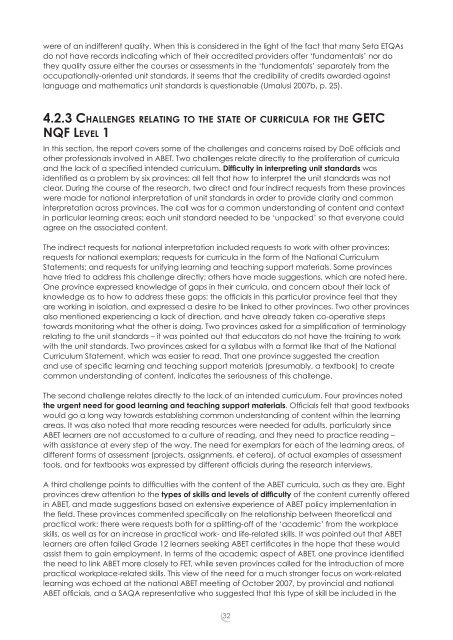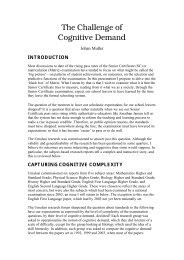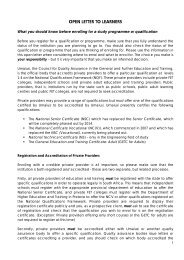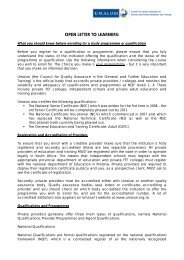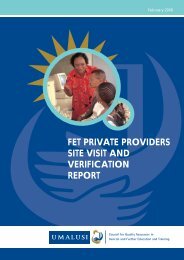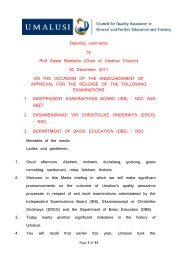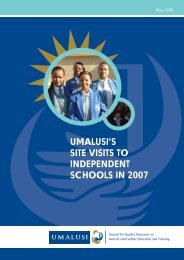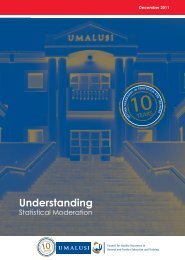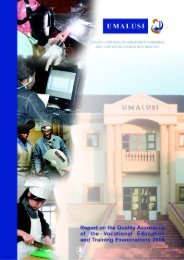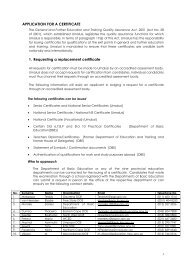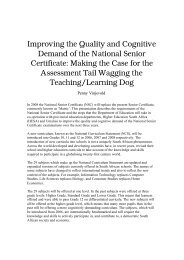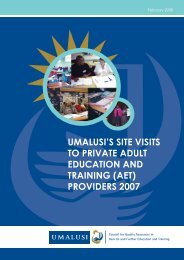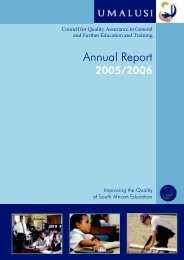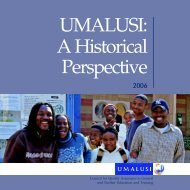Inspecting the Foundations - Umalusi
Inspecting the Foundations - Umalusi
Inspecting the Foundations - Umalusi
You also want an ePaper? Increase the reach of your titles
YUMPU automatically turns print PDFs into web optimized ePapers that Google loves.
were of an indifferent quality. When this is considered in <strong>the</strong> light of <strong>the</strong> fact that many Seta ETQAsdo not have records indicating which of <strong>the</strong>ir accredited providers offer ‘fundamentals’ nor do<strong>the</strong>y quality assure ei<strong>the</strong>r <strong>the</strong> courses or assessments in <strong>the</strong> ‘fundamentals’ separately from <strong>the</strong>occupationally-oriented unit standards, it seems that <strong>the</strong> credibility of credits awarded againstlanguage and ma<strong>the</strong>matics unit standards is questionable (<strong>Umalusi</strong> 2007b, p. 25).4.2.3 CHALLENGES RELATING TO THE STATE OF CURRICULA FOR THE GETCNQF LEVEL 1In this section, <strong>the</strong> report covers some of <strong>the</strong> challenges and concerns raised by DoE offi cials ando<strong>the</strong>r professionals involved in ABET. Two challenges relate directly to <strong>the</strong> proliferation of curriculaand <strong>the</strong> lack of a specifi ed intended curriculum. Difficulty in interpreting unit standards wasidentifi ed as a problem by six provinces: all felt that how to interpret <strong>the</strong> unit standards was notclear. During <strong>the</strong> course of <strong>the</strong> research, two direct and four indirect requests from <strong>the</strong>se provinceswere made for national interpretation of unit standards in order to provide clarity and commoninterpretation across provinces. The call was for a common understanding of content and contextin particular learning areas: each unit standard needed to be ‘unpacked’ so that everyone couldagree on <strong>the</strong> associated content.The indirect requests for national interpretation included requests to work with o<strong>the</strong>r provinces;requests for national exemplars; requests for curricula in <strong>the</strong> form of <strong>the</strong> National CurriculumStatements; and requests for unifying learning and teaching support materials. Some provinceshave tried to address this challenge directly; o<strong>the</strong>rs have made suggestions, which are noted here.One province expressed knowledge of gaps in <strong>the</strong>ir curricula, and concern about <strong>the</strong>ir lack ofknowledge as to how to address <strong>the</strong>se gaps: <strong>the</strong> offi cials in this particular province feel that <strong>the</strong>yare working in isolation, and expressed a desire to be linked to o<strong>the</strong>r provinces. Two o<strong>the</strong>r provincesalso mentioned experiencing a lack of direction, and have already taken co-operative stepstowards monitoring what <strong>the</strong> o<strong>the</strong>r is doing. Two provinces asked for a simplifi cation of terminologyrelating to <strong>the</strong> unit standards – it was pointed out that educators do not have <strong>the</strong> training to workwith <strong>the</strong> unit standards. Two provinces asked for a syllabus with a format like that of <strong>the</strong> NationalCurriculum Statement, which was easier to read. That one province suggested <strong>the</strong> creationand use of specifi c learning and teaching support materials (presumably, a textbook) to createcommon understanding of content, indicates <strong>the</strong> seriousness of this challenge.The second challenge relates directly to <strong>the</strong> lack of an intended curriculum. Four provinces noted<strong>the</strong> urgent need for good learning and teaching support materials. Offi cials felt that good textbookswould go a long way towards establishing common understanding of content within <strong>the</strong> learningareas. It was also noted that more reading resources were needed for adults, particularly sinceABET learners are not accustomed to a culture of reading, and <strong>the</strong>y need to practice reading –with assistance at every step of <strong>the</strong> way. The need for exemplars for each of <strong>the</strong> learning areas, ofdifferent forms of assessment (projects, assignments, et cetera), of actual examples of assessmenttools, and for textbooks was expressed by different offi cials during <strong>the</strong> research interviews.A third challenge points to diffi culties with <strong>the</strong> content of <strong>the</strong> ABET curricula, such as <strong>the</strong>y are. Eightprovinces drew attention to <strong>the</strong> types of skills and levels of difficulty of <strong>the</strong> content currently offeredin ABET, and made suggestions based on extensive experience of ABET policy implementation in<strong>the</strong> fi eld. These provinces commented specifi cally on <strong>the</strong> relationship between <strong>the</strong>oretical andpractical work: <strong>the</strong>re were requests both for a splitting-off of <strong>the</strong> ‘academic’ from <strong>the</strong> workplaceskills, as well as for an increase in practical work- and life-related skills. It was pointed out that ABETlearners are often failed Grade 12 learners seeking ABET certifi cates in <strong>the</strong> hope that <strong>the</strong>se wouldassist <strong>the</strong>m to gain employment. In terms of <strong>the</strong> academic aspect of ABET, one province identifi ed<strong>the</strong> need to link ABET more closely to FET, while seven provinces called for <strong>the</strong> introduction of morepractical workplace-related skills. This view of <strong>the</strong> need for a much stronger focus on work-relatedlearning was echoed at <strong>the</strong> national ABET meeting of October 2007, by provincial and nationalABET offi cials, and a SAQA representative who suggested that this type of skill be included in <strong>the</strong>32


